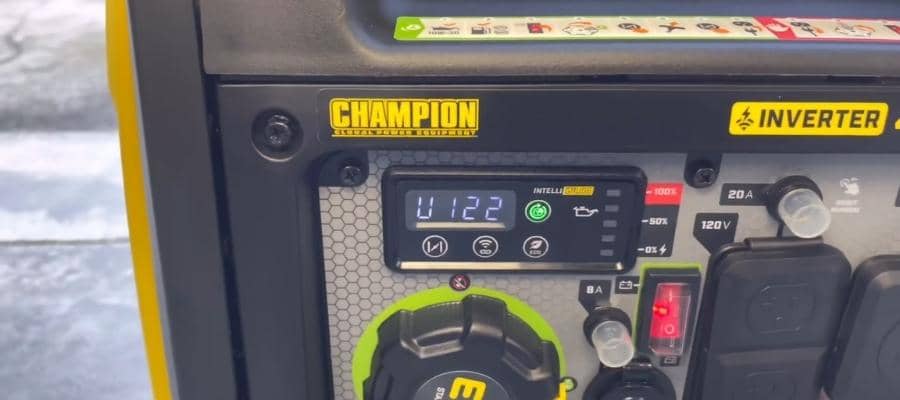
When compared to traditional portable generators, inverter generators are regarded for being a more quiet and lightweight option. Nevertheless, how is an inverter generator any quieter than a conventional generator when they both use fuel-powered engines?
The reason why some of the largest inverter generators are much quieter than conventional generators because of the the way it generates AC power and the design aspects of the machine.
Even while inverter generators and standard portable generators both use fuel, they operate in quite different ways, which is why the noise levels produced by each generator type differ as well. Learn how an inverter generator is quieter than a standard portable generator by reading on.
Why Does a Generator Make Noise?
Because of the way the engine functions, generators create noise. Conventional portable generators make noise because of internal fuel burning, engine movement within the enclosure, and the generator’s struggle to maintain 3600 revolutions per minute (rpm).
With an inverter generator, you can eliminate a couple of the noise-making variables, including the vibrations inside the casing and the engine’s 3600 RPM. Because of the inverter generator’s technology, it can run at a steady speed of 3600 revolutions per minute (rpm).
Consequently, inverter generators are quieter than standard portable generators.
How Inverter Generators reduce Noise?
An inverter generator’s quietness is mostly due to the technology it employs to generate clean power. In addition, manufacturers take use of the low-noise advantages of inverter generators and incorporate additional noise-reducing features into the machine.
To begin, let’s take a closer look at how an inverter generator reduces noise. A three-phase method is used by an inverter generator to create electricity: high frequency AC current is first transformed to DC current, and then the current is inverted back to AC.
DC current has a consistent noise level since it is a straight line. The final AC current’s sine wave is also almost perfect, therefore noise is controlled at this point as well.
Power, voltage, and frequency can all be more precisely controlled with this method. It’s because of this that an inverter generator will run at a steady 3600 rpm and modify its output power to meet a specific need.
Inverter generator engines are already quieter than those utilized in conventional portable generators. Additionally, because of their smaller size and reduced power output, inverter generator engines produce less noise.
Noise Reducing Design Features of Inverter Generators
It is well-known that inverter generators are quieter than conventional portable generators, thus manufacturers are constantly looking for ways to increase this advantage further.
Manufacturers add mufflers to inverter generator engines even though they already produce less noise. A muffler can reduce the sound of an engine by as much as 10 db, depending on the material used.
Conventional fuel-powered generators can also use mufflers, but they are not typically included in the design. Mufflers built by generator owners are not recommended because of the numerous health and safety risks involved with malfunctioning mufflers.
In addition to mufflers, an inverter generator’s enclosure is designed to reduce noise. Engine noise is heavily influenced by the materials used in the design.
A variety of noise-isolating materials are employed by inverter generators. Portable generators typically have open casings that allow sound waves to travel freely, however this isn’t the case with the newer models.
When to Use a Quiet Inverter Generator?
Having a quieter generator can be a bonus or a need depending on where you intend to utilize it. Each state, neighborhood, national park, campground, and nature reserve has its own set of acceptable noise levels.
Find out what the acceptable noise levels are in your area by contacting your local authorities. Even though residential areas are more tolerant of noise than outdoor locations, not all standard portable generators can meet this criteria due to the inherent limitations of their construction.
Residential areas have more lax noise regulations than outside ones, so you must determine whether the reduced noise levels of inverter generators outweigh the greater power of a standard portable generator.
Noise regulations at outdoor locations like campgrounds, national parks, and RVs tend to be tougher. In addition, there are less buildings surrounding, which means that sound waves travel more easily. You can use a good 3500 watt inverter generator in this case.
An inverter generator is a better choice if you frequently camp or stay in RV parks. In comparison to other types of portable generators, this one not only provides the power you need, but it also creates a lot less noise.
Can a Conventional Portable Generator Match an Inverter’s Quietness?
A typical portable generator still cannot be made as quiet as an inverter generator yet. Inverter generators differ mechanically from regular generators, which is the primary reason this isn’t viable.
There’s still a lot of noise even with noise-reducing equipment like mufflers and an enclosed case on a traditional portable generator. It is also impossible to construct a noise-reducing casing for standard portable generators because they cannot be covered while running.
Final words
In comparison to traditional fuel-powered portable generators, inverter generators are far quieter. They are quieter for a reason. They have additional design features that manufacturers use to reduce the noise even further. When you require a power supply in an outside setting, such as at a camping or a nature preserve, inverter generators are a safer option.
Read Next:
